Generally a beam consists of following steelreinforcements: Longitudinal reinforcement at tension and compression face. Shear reinforcements in the form of vertical stirrups and or bent up longitudinal bars. Side face reinforcement in the web of the beam provided when the depth of the web in a beam exceeds 750 mm.
Reinforcement detailing in beams
- Beam carries transverse external loads that cause bending moment, shear forces and in some cases torsion
- Concrete is strong in compression and very weak in tension.
- Steel reinforcement counter act tensile stresses in reinforced concrete beams.
- Mild steel bars or Deformed or High yield strength deformed bars (HYSD) used.
- HYSD bars have ribs on the surface and this increases the bond strength at least by 40%
Types of beams
The beams classes are as follows:Based on beam shape
- Rectangular beam
- L-shape beam
- Circular shape beam
- T-shape beam
When a beam is designed with slab, called slab beam or Tee-beam, reinforcements are provided as shown in figure below. The beam is generally designed as simple beam but additional reinforcement provided on top with slab to make it behave like a Tee-beam.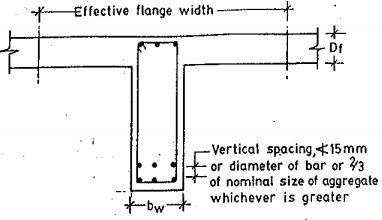 Mid-span Details of Tee-Beam.
Mid-span Details of Tee-Beam.
According to supporting conditions
Simply supported, fixed, continuous and cantilever beamsBased on embedded reinforcement
Singly reinforced
Reinforcement are provided to resist tensile stresses due to bending and shear in beams for singly reinforced sections. In practice, for singly reinforced beams, two additional bars are provided in compression face of the beam so that stirrups can be tied with bars. These additional reinforcement are of nominal diameter of 8mm or 10mm.
In practice, for singly reinforced beams, two additional bars are provided in compression face of the beam so that stirrups can be tied with bars. These additional reinforcement are of nominal diameter of 8mm or 10mm.Doubly reinforced
when depth of section is restricted due to reasons such as architectural reasons, or basement floors, the beam section is designed as doubly reinforced concrete beam.These bars shall withstand compressive stresses and are provided with reinforcement in compression face.Beams when subjected to torsion are provided additional longitudinal and shear reinforcement to resist bending and shear stresses developed due to torsion.Types of Reinforcement in Beams
Generally a beam consists of following steel reinforcements:- Longitudinal reinforcement at tension and compression face.
- Shear reinforcements in the form of vertical stirrups and or bent up longitudinal bars.
- Side face reinforcement in the web of the beam provided when the depth of the web in a beam exceeds 750 mm.
- Distribute minimum 0.1% of the web area equally on two faces at a spacing not exceeding 300 mm or web thickness, whichever is less.
Reinforcement Cover in Beam
- Minimum cover in beams must be 25 mm or shall not be less than the larger diameter of bar for all steel reinforcement including links.
- Nominal cover specified in Table 16 and 16A of IS456-2000 should be used to satisfy the durability criteria.
Stirrups
this type of reinforcement act against shear force. Following are the types of stirrups provided in beams: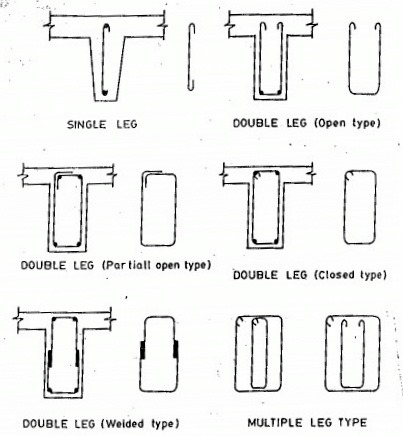 Types of stirrups in beams
Types of stirrups in beamsStandard hooks and bends
Commonly, the provision of steel bar anchorage is in form of bends and hooks provided that straight length insufficient to develop bars.Moreover, the anchorage value of bend of bar is taken as 4 times the diameter of bar for every 450 bend subjected to maximum of 16 times the diameter of bar.Added to that, The specification for detailing of reinforcement in beams are given in cl.26.5.1 of IS 456 – 2000. Lastly, standard bends and hooks required for reinforcing bars are shown in figure below.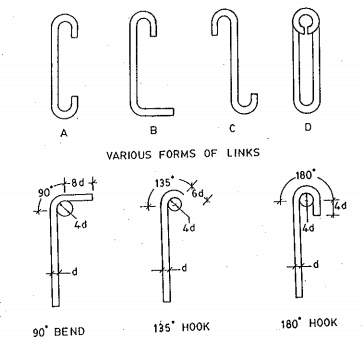 Standard bends and hooks in beams
Standard bends and hooks in beamsCurtailment of Reinforcement in Beams
Generally, curtailment of reinforcements performed along beam span based on the bending moment at the section. Moreover, anchorage or development length required at support is provided during curtailment of reinforcement.Furthermore, cl.26.2 of IS 456 – 2000 gives the anchorage length required for main reinforcement in tension and compression.Lastly, figure 5 shows typical details of curtailment of reinforcement in cantilever and continuous beams.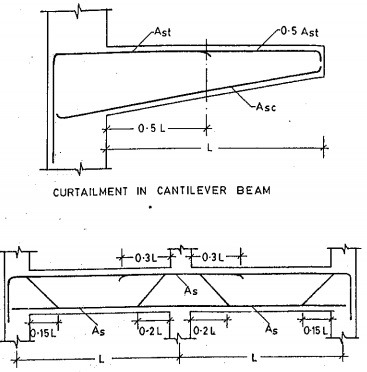 Typical Details of Reinforcement curtailment in beams
Typical Details of Reinforcement curtailment in beamsDevelopment length (Ld)
Figure 6 provides details of necessary anchorage length for main reinforcement in tension and compression: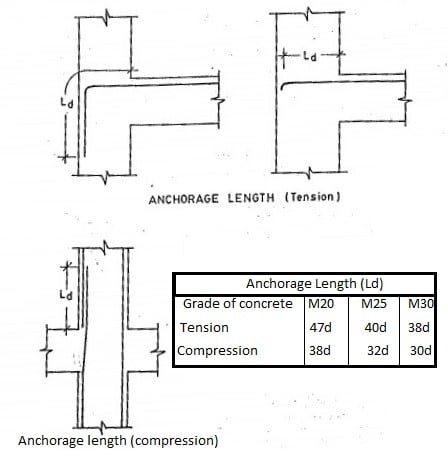
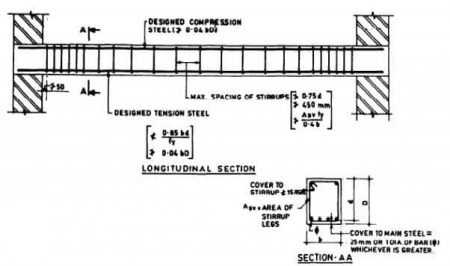

Thanks for sharing valuable post. Ksteel is the Top dealer of reinforcement bars in Bangalore. Find your choice full reinforcement bars, sail tmt bar, crs grade tmt at best steel rod prices.
ReplyDelete